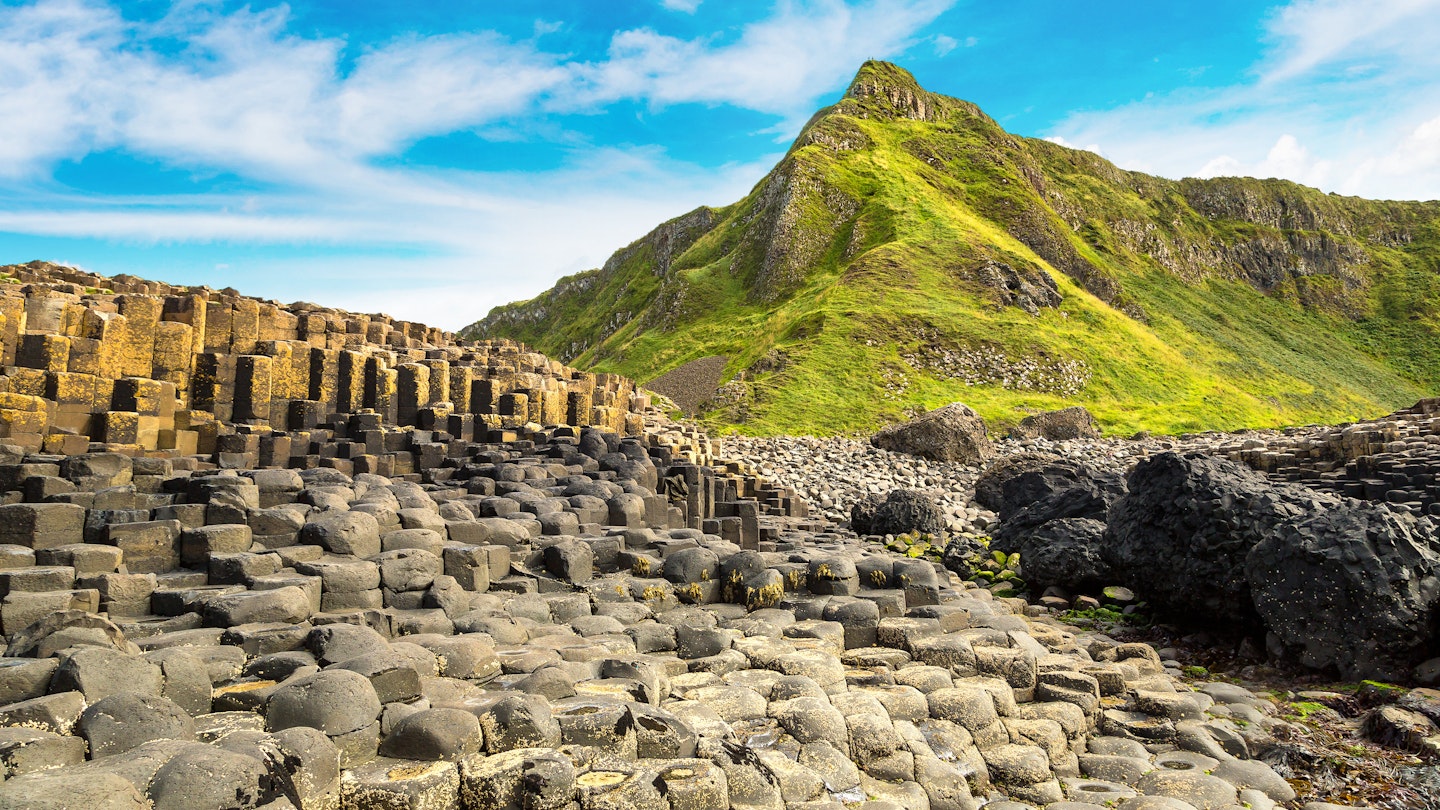Giant’s Causeway
This spectacular rock formation – Northern Ireland’s only Unesco World Heritage site – is one of Ireland’s most impressive and atmospheric landscape features, a vast expanse of regular, closely packed, hexagonal stone columns looking for all the world like the handiwork of giants.
The phenomenon is explained in the Giant’s Causeway Visitor Experience, housed in a state-of-the-art, eco-friendly building half-hidden in the hillside above the sea. Visiting the Giant’s Causeway itself is free of charge but you pay to use the car park on a combined ticket with the visitor center; parking-only tickets aren’t available.
Cliffs of Moher
In good visibility, the Cliffs of Moher (Aillte an Mothair, or Ailltreacha Mothair), located in western Clare, are staggeringly beautiful. The entirely vertical cliffs rise to a height of 214m (702ft), their edge abruptly falling away into a ceaselessly churning Atlantic.
In a progression of vast heads, the dark sandstone and siltstone strata march in a rigid formation. Views stretch to the Aran Islands and the hills of Connemara. Sunsets here see the sky turn a kaleidoscope of amber, amethyst, rose pink, and deep garnet red.
One of Ireland’s blockbuster sights, it includes a high-tech visitor center, a 19th-century lookout tower, and a wealth of walking trails. Visiting by boat can bring the best views.
Dun Briste
An astonishing sea stack that’s lashed by foaming sea, Dun Briste is Mayo’s top natural sight. Legend attests that St Patrick drove all the vipers from Ireland onto the stack on Downpatrick Head, leaving the mainland snake-free. Try to choose a clear day for a visit to amplify the visuals. You can drive most of the way up to the sea edge, but then you’ll need to walk the last 400m (1312ft) or so. Dun Briste is 6km (3.7mi) northeast of Ballycastle.
The sea stack was shorn from the mainland in 1393 by a severe storm that left poor unfortunates stranded upon it (later rescued). Indeed, the remains of buildings survive on the stack to this day.
A viewing area has been constructed by a huge blowhole set back slightly from the cliff edge. It has numerous plaques detailing the history and folklore of the area. During storms, seawater is dramatically blasted through the blowhole.
Sliabh Liag
The Cliffs of Moher get more publicity, but the cliffs of Sliabh Liag (Slieve League) in Southwestern Donegal are higher (and free). In fact, these spectacular sea cliffs are among the highest in Europe, plunging some 600m (1969ft) to the ceaselessly churning sea.
From Teelin, a road through the stark landscape leads to the lower car park (with hiking signs) beside a gate in the road; drive another 1.5km (0.93mi) to the upper car park (often full in summer) right beside the viewpoint (close the gate though).
Gap of Dunloe
The Gap of Dunloe in the Killarney Region is a scenic valley squeezed between Purple Mountain and the eastern summits of MacGillicuddy’s Reeks. In the summer, it can be a bottleneck crammed with coaches depositing crowds of day-trippers for one-hour pony-and-trap rides through the pass. Rather than joining the hordes, think about hiring a bike and cycling the route.
Carrauntoohil
Macgillycuddy’s Reeks is Ireland’s highest mountain range, and towering Carrauntoohil in the Killarney region is the country’s highest summit, at 1040m (3412ft). There are several routes up, though even the most straightforward path requires good hillwalking and navigation skills, while others are serious scrambling or rock-climbing routes.
The Burren
Stretching across northern Clare, the rocky, windswept Burren region is a unique striated lunar-like landscape of barren grey limestone that was shaped beneath ancient seas, then forced high and dry by a great geological cataclysm. It covers 250 sq km (97 sq mi) of exposed limestone and is 560 sq km (216 sq mi) in total.
Wildflowers in spring give the Burren brilliant, if ephemeral, color amid its stark beauty. Villages throughout the region include the music hub of Doolin on the west coast, Kilfenora inland, and charming Ballyvaughan in the north, on the shores of Galway Bay.
Lough Glencar Waterfall
The poet WB Yeats is among those who’ve fallen for this 15m (49ft) tumbling torrent, set in the most beautiful area of Lough Glencar – it features in his poem The Stolen Child. There are astonishing views over the water, especially towards sunset; it’s particularly impressive after heavy rain. There’s a car park right at the foot of the hill.
Caves of Keash
Around 6km (3.7mi) southeast of Ballymote, these splendid limestone Caves of Keash high in Keshcorran Hill make for a fun expedition. You can park near the bottom at the fields at the foot of the slope and climb on up. It doesn’t take long to reach the 16 caves, some of which are pretty deep, and afford excellent views over the countryside. Mind your step as it is steep and can be slippery after rain.
Lough Tay
Located in the Wicklow Mountains, Lough Tay (also known as Guinness Lake) is backed by steep scree slopes descending from Luggala (Fancy Mountain). The picturesque valley is one of the area’s most popular destinations and surrounded by spectacular countryside.





